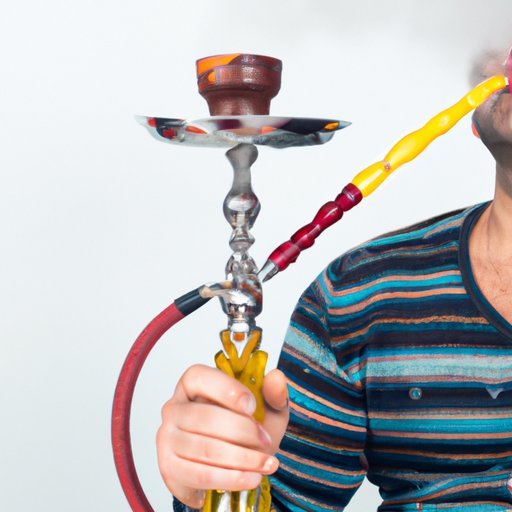
Introduction
Before diving into the effects of hookah on the brain, it’s important to define what hookah is and what we mean by “getting high.” Hookah is a smoking device that involves heating flavored tobacco, called shisha, and inhaling the resulting smoke through a water pipe. Many people believe that smoking hookah can create a pleasurable, euphoric sensation that is similar to getting high on other substances like marijuana.
The topic of hookah and getting high is important because it raises questions about the safety and risks associated with this popular practice. While hookah may seem like a harmless way to relax and socialize with friends, there may be more to the story when it comes to the chemicals inhaled and the potential effects on the brain.
The Science Behind Hookah and Its Effect on Your Brain
When you smoke hookah, you are inhaling a mixture of smoke and gases, including carbon monoxide, tar, and nicotine. Each of these chemicals can have a different effect on the brain and body, leading to a range of physical and psychological symptoms. The way hookah creates a “high” is through the effects of nicotine, which is a highly addictive substance that can create a sense of euphoria and relaxation in some people.
However, the effects of nicotine can be short-lived and lead to a range of negative health outcomes, including addiction, increased heart rate, and lung disease. Additionally, because hookah smoke is often mixed with other chemicals and flavorings, it can be difficult to know exactly what you are inhaling and what the long-term effects on the brain and body could be.
Why Hookah Is Becoming Less Popular Among Young Adults
In recent years, there has been a cultural shift away from smoking in general, which has had an impact on the popularity of hookah among young adults. Public health campaigns and antismoking laws have created a greater awareness of the risks associated with smoking and have made it more difficult to smoke in public places. As a result, fewer young adults are choosing to smoke, and those who do are often doing so in more private settings where hookah may be less accessible.
Additionally, social pressures and changing attitudes towards smoking may be contributing to the decline in popularity of hookah. Many young people are aware of the health risks associated with smoking and are choosing to avoid it altogether, leading to a change in social norms around smoking in general.
Hookah vs. Other Substances: Understanding the High
When comparing hookah to other substances like marijuana, it’s important to understand the similarities and differences in the effects on the brain. Both substances can create a sense of euphoria and relaxation, but the chemical makeup of each substance is different and can lead to different long-term effects on the brain and body.
For example, the effects of marijuana are primarily caused by THC, a psychoactive compound that can alter the brain’s perception of time, space, and reality. On the other hand, the effects of hookah are primarily caused by nicotine, which is a stimulant that can create a temporary sense of euphoria and relaxation.
Debunking Myths About Hookah and Getting High
There are many common myths and misconceptions surrounding hookah and getting high that can be misleading or harmful to those who are curious about the practice. Some of these myths include the idea that hookah is less harmful than cigarettes or that it can help with stress and anxiety.
However, scientific evidence suggests that many of these myths are simply not true. In reality, hookah can be just as harmful as cigarettes, if not more so, and the chemicals inhaled can create a range of negative health outcomes. Additionally, while hookah may seem like a good way to relax and socialize with friends, the effects of nicotine can actually increase feelings of anxiety and stress over time.
The Social vs. Chemical Appeal of Hookah: Why We Smoke It
When it comes to hookah, there are many factors that contribute to its social and chemical appeal. For some, the act of smoking hookah is a way to socialize with friends and connect with others in a relaxed, informal setting. For others, the chemical effects of nicotine can create a temporary sense of euphoria and relaxation that can be appealing.
However, it’s important to understand the potential risks and negative health outcomes associated with smoking hookah, and to consider the long-term effects on the brain and body. By separating fact from fiction and making informed choices about smoking, we can better understand the appeal of hookah and make choices that are best for our overall health and wellbeing.
Conclusion
Overall, the topic of hookah and getting high is a complex and multifaceted one that requires careful consideration and exploration. By understanding the chemicals involved, the social and cultural factors that contribute to its appeal, and the myths and misconceptions surrounding the practice, we can better understand the risks and benefits of smoking hookah and make informed choices about our own health and wellbeing.
Whether you are a curious curious individual looking to learn more about hookah, or someone who is interested in cutting back or quitting smoking in general, it’s important to keep an open mind and seek out accurate, reliable information about this popular practice.





